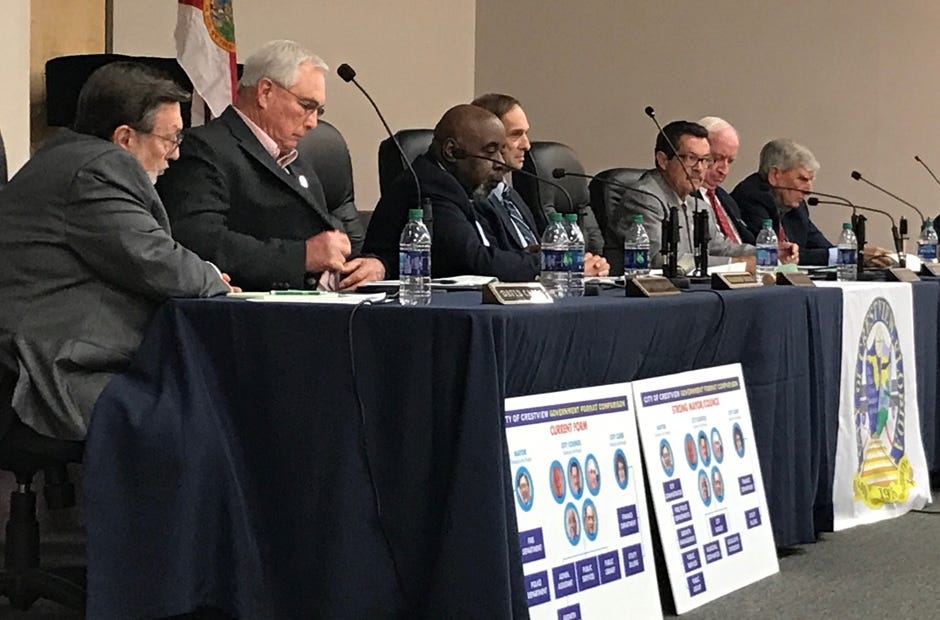![Mayor David Cadle and City Council sit beside signs depicting the current government structure. This structure could change if voters decide for reform. [MARK JUDSON/NEWS BULLETIN]](http://127.0.0.1/wordpress/wp-content/uploads/2022/01/ghows-DA-4d4b77d6-3373-2e35-e053-0100007fe439-9666a810.jpeg)
1. Past failure
The City Council’s effort to possibly alter the city charter and government structure isn’t Crestview’s first venture into the reform.
The measure was presented to voters Nov. 6, 2012, after an extensive, multi-year review process. The ballot question asked voters if they would approve of the hiring of a city administrator—replacing the mayor-council government structure—and making the city clerk an appointed position, as opposed to elected.
The question needed a simple majority to pass but fell short. Results showed 4,319 people voted against the measure and 3,795 voted to approve.
Although it was featured on the ballot, a clerical error made the question invalid. Several hundred voters in the 2012 election didn’t vote on the reform, possibly due to its invalid status, according to current City Council President J.B. Whitten.
2. Size an issue
Crestview currently operates under a council-mayor form of government, which is commonly used by large areas like New York City and Houston or by small towns, according to the National League of Cities.
Larger cities, like Pensacola, opt for a strong mayor system, which places departments and administrative positions under the mayor’s supervision and sometimes grants mayors veto power over city council. Smaller cities often use a weak mayor structure that gives limited oversight to the mayor and instead places city departments under the council.
There are 84 cities in Florida that use a council-weak mayor structure, out of the state’s 411 total cities. Only 33 of those—not including Crestview—have a population over 1,000. Crestview (approximately 24,000 residents) and Sebring (approximately 10,400 residents) are the only two council-weak mayor governments in Florida with populations over 10,000.
Whitten believes this is a sign the city has outgrown its current form of government.
3. Changes aren’t just about a city manager
Most of the conversation about changing the charter has focused on the hiring of a city manager but this isn’t the only decision that could possibly be on a ballot.
One other contested topic is a possible alteration to the selection of a city clerk. Crestview elects its clerk position, as opposed to most Florida cities, which appoint their clerk. The difference resides in qualification standards and accountability.
Electing a city clerk can lead to questions about a candidate’s qualifications and ability to perform the tasks of the position. This is compared to an appointed position, which gives the mayor or council ability to hire someone based on their experience and can terminate their employment if they believe it is sub-par. This issue was raised in DeFuniak Springs in 2010.
However, supporters of an elected clerk argue that it reduces the chance of possible corruption because the clerk is answerable to the people and not other officials. Therefore, if a clerk were to be pressed to do something unethical or against standard procedure, they would be able to say “no” without risk or termination. An elected clerk, in this theory, is accountable to the voters first and thus, creates a more transparent government.
4. The cost of change
While city council members and mayors make little to no money in salary, a city manager is a different situation.
Fort Walton Beach pays their city manager Michael Beedie $120,000 per year in salary, which is an average amount for cities that size, he said.
Crestview has not yet disclosed what a manager would be paid but six figures per year would be a large investment for the city. These costs can be made up by cuts to other funds but Beedie added improving the efficiency of the city has been worth the extra cost to Fort Walton Beach.
The city would also have to pay to place the motion on a ballot if they decide to move forward with a reform. However, these costs are in the range of a few hundred dollars and have yet to be a deciding factor in any conversations.
5. How Crestview residents will decide
If a review commission is created and decides to reform the city charter, residents will have the final say at the polls—and maybe at the mailbox.
Officials and residents have discussed mailing the ballot to eligible voters as a way to increase voter turnout. The city’s elections in March generated a little over three percent turnout. Okaloosa County Supervisor of Elections Paul Lux confirmed at a previous City Council meeting the measure could be done via mail.
Aside from how residents can vote, it’s still undecided how many items they’ll be voting for.
Beedie and former City Councilman Tom Gordon believe that lumping all aspects of the bill into one question could cause residents to vote “no” if they disagreed with one aspect but agree with everything else. Gordon believes this was an issue in the 2012 election.
When Fort Walton Beach adopted a new city charter several years ago, voters had seven measures to vote on. Officials were concerned residents would get “voter fatigue” and not make a decision, according to Beedie, but that was not the case. That decision was made partially in response to seeing Crestview’s reform attempt fail by having all measures lumped together, he added.
Splitting measures apart also allows for more in-depth descriptions on each issue. Florida limits ballot summaries to 75 words, making it difficult to fully describe several measures.
This article originally appeared on Crestview News Bulletin: 5 things to know about a charter reform
